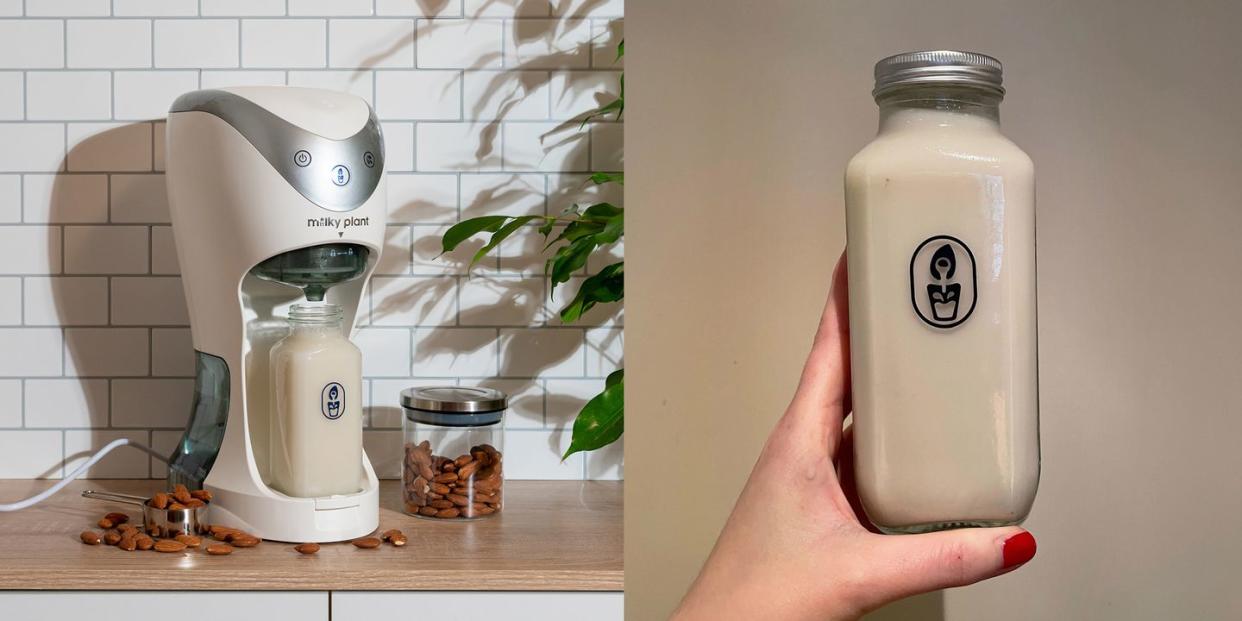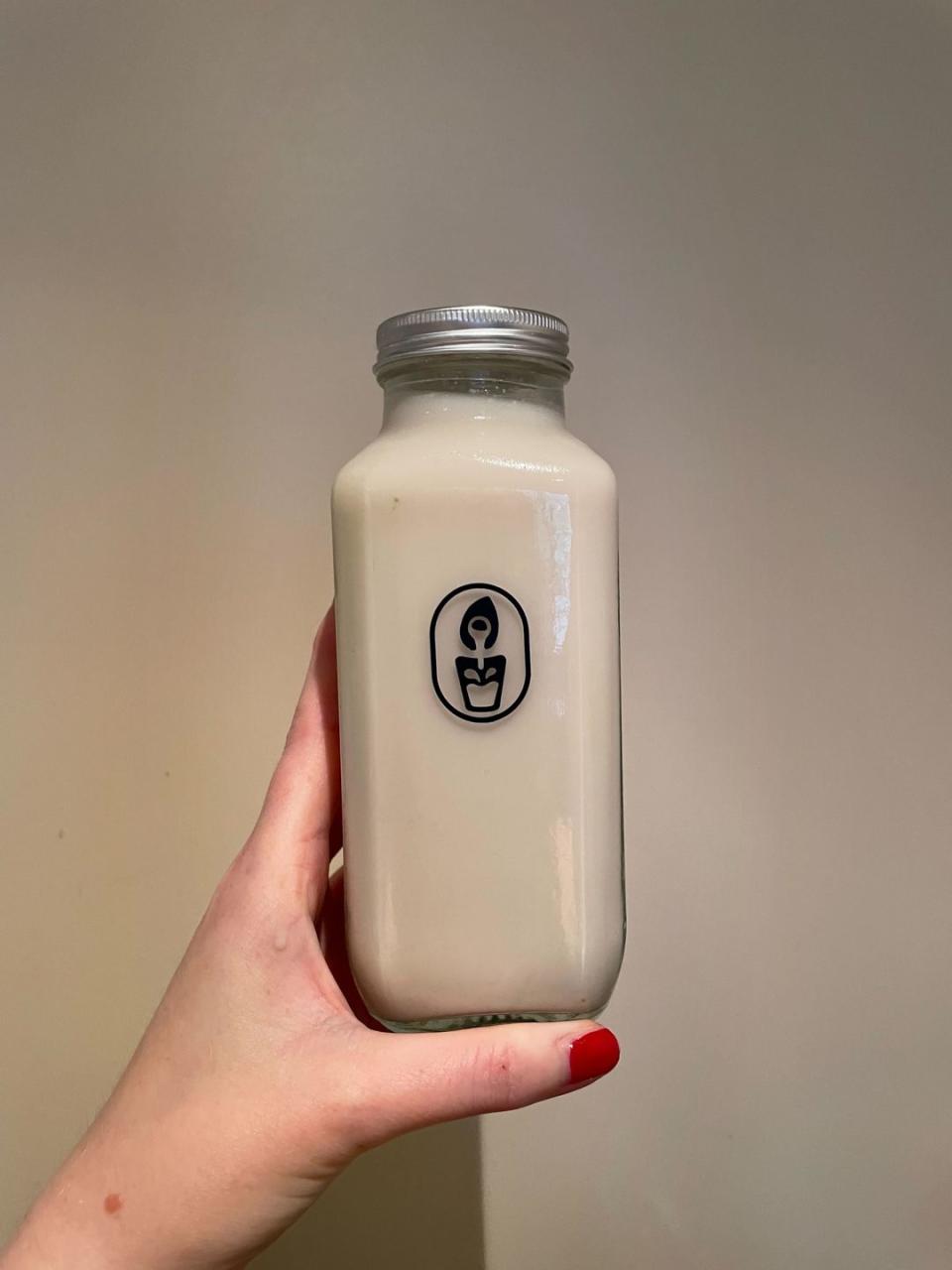Milky Plant review: delicious, home-made nut milk in just 3 minutes

Nut and plant-based milks have become increasingly popular in recent years, with studies showing 46% of Britons have ditched dairy in favour of vegan alternatives.
And London-based brand Milky Plant has created a machine that takes the hard work out of making your own.
The machine, which is currently reduced to £290 from £340, allows you to create any non-dairy milk you like using just tap water and an 80g serving of your preferred ingredients.
There’s no need to pre-soak or strain anything beforehand, and you can alter the thickness, sweetness and flavour to whip up everything from trusty oat milk to more adventurous blends such as blueberry quinoa and hazelnut chocolate milk.
It works somewhat like an espresso machine. You pop the raw ingredients, be it coconut flakes, almonds, hemp or oats, into a grinder at the top. The machine grinds them up, blends them with water and passes the liquid through a filter to strain the milk and remove pulp.
The result? Healthier, tasty plant-based dairy alternatives, freshly made for as little as 42p per litre.
The case for DIY oat milk
The arguments are compelling. Plant-based dairy alternatives have a smaller impact on water, land and carbon emissions than cow’s milk, but there’s still a sizeable environmental impact associated with large-scale commercial operations. Making your own helps reduce the use of single-use milk cartons and the need for transportation and refrigeration.
Shop-bought plant-based milks can also be pricey, with organic offerings costing up to £2.50 per litre. Going DIY allows you to avoid supermarket markups and pay only for the ingredients actually used. Homemade options also tend to omit the preservatives, emulsifiers and additives typically found in commercial options that you may wish to avoid.
Using the Milky Plant
I’m one of the Brits that’s made the switch to plant-based milk, so I was excited to try this machine. It makes a chic addition to my worktop, being no more of an eyesore than your average espresso machine or toaster. Although, it is slim enough to be stored in a kitchen cupboard if needed.
I made a bottle of both oat and almond milk to see how they would fare in comparison to my regular Sainsbury’s buys. In use, the machine is rather loud and tends to rattle a little, but I was impressed with how quick and easy the extraction process was. Both times, I had 500ml of fresh plant-based goodness ready to go in just three minutes.
The almond milk was nice; nutty with a hint of sweetness, and not too different from the supermarket version. My homemade oat milk also tasted very similar to the Sainsbury’s version – sweet and tasty. Adding a splash to my usual porridge, coffee and smoothies, I saw no difference in the resulting texture or taste. The flavour wasn’t overpowering and the milks didn’t separate in use.
However, both had a noticeably thinner consistency than the supermarket offerings, needing a shake after a spell in the fridge. This was initially jarring and I missed the creaminess from my regular buys.

Brand advice is that increasing the amount of ingredients can help improve thickness, so I added an extra half scoop of almonds and a tablespoon of maple syrup to my next attempt. This did create a thicker, creamier finish, and I was much happier.
It means some experimentation may be required to find the sweet spot for you, but that’s all part of the fun. There are plenty of recipes on the brand’s website, giving you the opportunity to create a far greater variety of drinks than you’d find in the supermarket’s dairy-free section; a draw that alone goes a considerable way to justify the machine’s price tag.
I whipped up some delicious almond chocolate milk by adding a tablespoon of cocoa powder and a dollop of maple syrup in with the almonds. I’ve also started adding a few drops of vanilla essence to the occasional batch to up the sweetness. Tap water is fine to use, but keep some chilled water on hand if you need cold milk straight away, as the machine doesn’t cool the milk.
The machine has a self-cleaning function, which takes 60 seconds and has left it sparkling every time, even after multiple uses. The filter needs emptying after each use, but you can reuse this pulp in other recipes like granola or biscuits, or pop it in your compost bin.

Milky Plant: The verdict
But now the big question: does it actually help you save money – or the environment? Well, it’s a yes on the financials. I’ve had the machine for a month and I’ve saved around £20 on what I’d usually spend on milk in that time, meaning potential savings of £240 a year (not including the price of the machine).
I was most impressed with the savings on oat milk. A 90p spend on 1kg of oats created six litres of milk, which would have cost £17.40 at Sainsbury’s, meaning I saved £16.50 by going homemade.
Reusing the same glass bottle has also stopped me buying two single-use cartons every week. With only 10% of household plastics actually getting recycled in the UK, it’s good to know I’m avoiding sending waste to landfill wherever possible. There’s more we can all do to reduce our personal carbon footprints, but this feels like a positive step for me.
Where to buy the Milky Plant
It’s easy to be impressed with the Milky Plant. The results taste great, you’ve full control over ingredients, there’s plenty of room for creativity and the milk is quick and easy to make.
It’s certainly an investment, but one that comes with plenty of benefits, and I’m excited to see what more I can do with my machine going forward.
You can shop the Milky Plant machine on the brand’s website, or take a look at some alternatives below.
..
You Might Also Like


